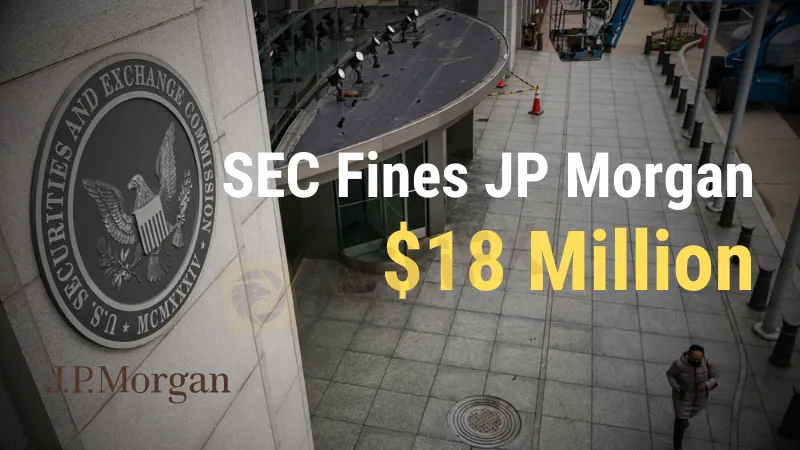简体中文
繁體中文
English
Pусский
日本語
ภาษาไทย
Tiếng Việt
Bahasa Indonesia
Español
हिन्दी
Filippiiniläinen
Français
Deutsch
Português
Türkçe
한국어
العربية
SEC Fines JP Morgan $18 Million
Abstract:JP Morgan hit with $18M fine for SEC whistleblower rule violation. Learn about the case and its implications. Stay informed with our updates.

J.P. Morgan Securities LLC (JPMS) has found itself in hot water with the Securities and Exchange Commission (SEC) and has agreed to pay a substantial $18 million penalty to resolve allegations of wrongdoing. The SEC has accused JPMS of obstructing its clients from reporting potential violations of securities laws to the regulatory body, a clear violation of whistleblower protection rules.
Here's the crux of the matter: From March 2020 to July 2023, JPMS repeatedly requested its retail clients to sign confidential release agreements, but only if they had received credits or settlements from the company exceeding $1,000. These confidential agreements mandated that clients keep any information related to the settlement and underlying facts confidential. More importantly, these agreements prohibited clients from voluntarily reaching out to the SEC, even though they were allowed to respond to SEC inquiries.
The SEC has come down hard on JPMS for this practice. According to Gurbir S. Grewal, Director of the SEC's Division of Enforcement, “Whether it's in your employment contracts, settlement agreements, or elsewhere, you simply cannot include provisions that prevent individuals from contacting the SEC with evidence of wrongdoing.” Essentially, JPMS put its clients in a difficult situation by making them choose between receiving settlements or credits from the firm and reporting possible securities law violations to the SEC. This either-or scenario not only compromised critical investor protections but was also found to be illegal.

Corey Schuster, Co-Chief of the Enforcement Division's Asset Management Unit, emphasized that “Investors, whether retail or otherwise, must be free to report complaints to the SEC without any interference.” Anyone drafting or using confidentiality agreements needs to ensure they do not include provisions that obstruct potential whistleblowers.
JPMS has been found in violation of Rule 21F-17(a) under the Securities Exchange Act of 1934, a whistleblower protection rule explicitly prohibiting actions that hinder individuals from communicating directly with the SEC staff regarding possible securities law violations. While JPMS did not admit wrongdoing, it agreed to a series of measures. These include accepting censure, committing to cease from violating the whistleblower protection rule in the future, and paying the $18 million civil penalty.
The SEC's investigation into JPMS's practices was conducted by Marie DeBonis and Jessica Neiterman, with the assistance of John Farinacci, and it was overseen by Virginia Rosado Desilets, Brianna Ripa, Mr. Schuster, and Andrew Dean, all members of the SEC's Asset Management Unit. Rua Kelly of the Trial Unit also provided support during the investigation.
In conclusion, JPMS's $18 million penalty underscores the importance of adhering to whistleblower protection rules and ensuring that individuals, regardless of their position, can freely report concerns to the SEC. This case serves as a stark reminder that the integrity of our financial system relies on transparency and accountability, and actions that obstruct these principles will not be tolerated.
Explore J.P. Morgan's profile on WikiFX for in-depth information: Visit their WikiFX page here: https://www.wikifx.com/en/dealer/8981623292.html

Disclaimer:
The views in this article only represent the author's personal views, and do not constitute investment advice on this platform. This platform does not guarantee the accuracy, completeness and timeliness of the information in the article, and will not be liable for any loss caused by the use of or reliance on the information in the article.
Read more

SEC Ends Crypto.com Probe, No Action Taken by Regulator
The SEC has closed its investigation into Crypto.com with no action taken. Crypto.com celebrates regulatory clarity and renewed momentum for the crypto industry.

Bitpanda Secures Full Broker-Dealer License in Dubai
Bitpanda has officially obtained a full broker-dealer license from the Dubai Virtual Assets Regulatory Authority (VARA), marking a significant milestone in its international expansion. This approval, which follows preliminary authorization granted three months earlier, enables the European digital asset exchange to introduce its comprehensive suite of virtual asset services to investors in the United Arab Emirates (UAE).

Interactive Brokers Expands Crypto Trading with Solana, XRP, Cardano, and Dogecoin
Interactive Brokers adds Solana, XRP, Cardano, and Dogecoin to its platform, enabling U.S. and U.K. clients to trade crypto 24/7 with low fees.

Gold Surges to New Highs – Is It Time to Buy?
Recently, gold prices have once again set new records, surpassing $3,077 per ounce and continuing a four-week winning streak. Is It the Right Time to Invest?
WikiFX Broker
Latest News
Why Are Financial Firms Adopting Stablecoins to Enhance Services and Stability?
Experienced Forex Traders Usually Do This Before Making a Lot of Money
Octa vs XM:Face-Off: A Detailed Comparison
When High Returns Go Wrong: How a Finance Manager Lost RM364,000
Bridging Trust, Exploring Best—WikiEXPO Hong Kong 2025 Wraps Up Spectacularly
Interactive Brokers Expands Crypto Trading with Solana, XRP, Cardano, and Dogecoin
Fidelity Investments Explores Stablecoin Innovation in Digital Assets Sector
Why More People Are Trading Online Today?
SEC Ends Crypto.com Probe, No Action Taken by Regulator
Broker Comparison: FXTM vs XM
Currency Calculator







